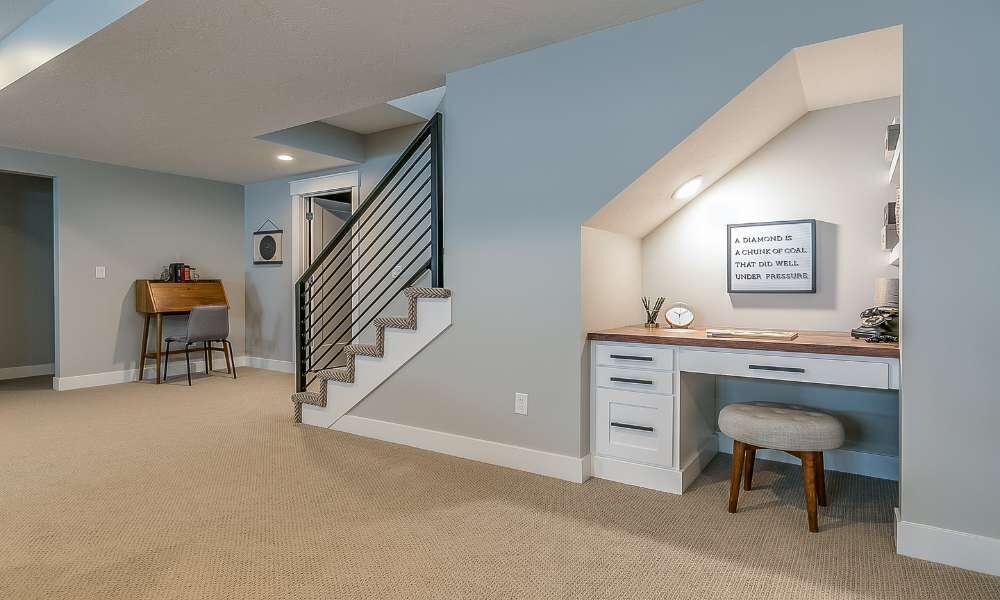In today’s rapidly evolving work environment, The need for A functional And dedicated home office space has become more vital than ever. As remote work continues to gain popularity, Many individuals are seeking innovative solutions to establish A productive work environment within the comfort of their homes. One promising option lies within the often underutilized basement. Transforming your basement into A well-designed And efficient home office not only maximizes available space but also provides A secluded And quiet area that promotes concentration And productivity. This introduction aims to explore the benefits, Practical considerations, And essential elements involved in creating A home office in your basement, Offering valuable insights And guidance for individuals looking to optimize their work-from-home experience.
How to Create an Office in Your Basement?
Basements are often seen as a place to store clutter, but that doesn’t have to be the case. With some creative flair and some hard work, you can transform your drab, dark basement into an inviting home office space. In this article, we inform you how to create a home office in your basement. There are some easy guides for doing that job.
Begin by determining how much space you require. This will determine if a full basement office is necessary or if it can be squeezed into another room.
If you want to utilize your office space in the evenings or on weekends, it’s essential that you create a separate area for it. This can be accomplished with bookshelves or wall-mounted units that will separate it from other parts of the room.
Second, consider your work style and which furniture best suits your requirements. For instance, if you tend to produce a lot of paperwork, investing in a storage unit that keeps all your documents organized is wise.
If you need to move around and don’t have much room, a desk chair that can be moved around will make it simpler to move and work.
For a successful basement office, you need proper lighting, storage solutions, and an organized entrance. Furthermore, noise reduction should also be taken into account.
1. Reduce Clutter in the Area
Clutter is the number one enemy of any workspace, especially a basement. To combat this problem, clear away any boxes, clothing, and other items that are taking up valuable space. Alternatively, utilize storage solutions that will conceal messes and make the room appear less cluttered.
2. Create a Real Desk
Basements don’t have the same ceiling height as your main floor, so you need a desk that allows you to sit and work comfortably. This could hold a desk found at a garage sale or one you order and assemble yourself.
3. Add a Comfortable Chair
A comfortable desk chair can help you stay focused on your work even when there are many distractions around you. Plus, it will serve as an excellent place to unwind after long days at the office.
4. Opt for Light and Bright Colors
If your basement doesn’t receive much natural sunlight, paint the walls in light colors instead. This is especially crucial if your ceilings are low as dark shades can make the space feel cramped and overwhelming when dimly lit.
5. Consider Installing a Walkout Door
Consider installing an entrance to your basement office. This will provide easy access for clients and make the space feel bigger.
6. Insulate the Area
Basements tend not to get much natural sunlight, so it’s essential to insulate them from outside influences. Doing this can reduce energy bills and make the space more aesthetically pleasing.
By following these tips, you can create a comfortable and productive basement office space. If you need help with this task, you can always contact Kitchener basement finishing services to get the job done properly. They will provide expert advice and assistance to ensure that your basement office meets all your needs.
Final Thoughts
In conclusion, creating a home office in your basement can be a great solution for making the most of an often underutilized space. It is relatively easy to do and allows homeowners to enjoy additional privacy, convenience, and improved personal productivity. To successfully create a home office in the basement, it is important to assess the unique needs of the user and plan accordingly. Careful consideration should be given to ergonomics and lighting, as well as the adequacy of storage solutions.




